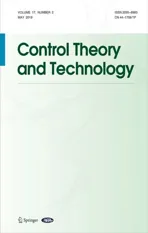Editorial
2019-02-18
Special issue on benchmark problems in automotive system control
Control theory is the field that is deeply connected with mathematics.To control a physical process or a dynamical system, the control law, so-called control algorithm, is usually deduced in mathematical way. This leads a lot of control theorist to work on “pure control theory” and leave from the physical background. The gap between control theory and practice is sometimes pointed out by the engineers, since a lot of advanced control methods provided by the research community of control theory cannot be directly implemented for solving many industrial problems. Benchmark problem plays the role of bridge between the theoretical research and industrial practice.Usually,a benchmark problem is proposed by academic community or jointly with industrial community to highlight challenging issues in a focused problem with common interested practical background.For control problem,many technical committees of international federation of automatic control(IFAC)proposed a lot of benchmark problems in the past.These benchmark problems attracted attention from both of theorist and control practitioners,especially younger researchers and students, and pushed control theorist to challenge practical problem and innovation in industrial control technology.This special issue focused on the benchmark problems in automotive system control which are mainly organized by IFAC technical committee and the related community such as the society of instrument and control engineers(SICE),Japan.
The first paper is written by Lars Eriksson,who is serving the chair of TC7.1 of IFAC.This paper provides a survey on various control benchmark problems, especially automotive control benchmarks organized by the international conferences in the past decade. The detailed references and the evaluation on the problems provide an index for further searching of the benchmark problems.The next two papers by Yutaka Hirano and Junichi Kako,respectively,are from industry side.The paper by Hirano presents a short summary on vehicle control benchmark proposed by JSAE-SICE,and the paper by Kako reviews the benchmark problem of starting speed control of combustion engines.The latter is a timely challenging issue for engine control under the background of practical technology developing such the concept of idling stop car that aims emission reduction.The paper is followed by the next one by Jiangyan Zhang,Zenhui Xu and Jinwu Gao,which revisits the challenging benchmark problem with new idea,mainly modified the fueling path control law which is challenging issue in control a combustion engine at transient operation mode.
Common rail control problem is another big challenging issue for combustion engine control. The paper by Chao Wu, Kang Song, and Hui Xie addressed this challenging issue with observer-based model predictive control method. Indeed, this control problem is proposed as benchmark problem for the 5th IFAC Conference on Engine and Powertrain Control, Simulation and Modeling, Changchun. Detailed description of the benchmark problem is presented by the paper, Qinfang Liu, Jinlong Hong, Bingzhao Gao, and Hong Chen. Two challenger groups are invited to present their challenging results.The paper by Zhiming Zhang,Lei Xie and Hongye Su,and the paper by Chen Zhang, Ying Zhang, Cong Chai, and Miaolei Zhou. The former demonstrated a solution on this challenging issue with predictive functional control theory,and the latter approached this benchmark problem by using sliding mode control.Finally,a paper investigated the application of sliding mode control and alternative active disturbance rejection control in electric machine,by Yang Zhao and Lili Dong,is included in this special issue which will motivate the control technology of electrified powertrain of vehicles.
We hope this special issue will provide new inspiring to the community of control theory,especially for the younger researchers and students.We wish to thank Yiguang Hong,Editor of the journal of Control Theory and Technology,for his timely organization of this special issue.
Guest editor:
Tielong SHEN
Sophia University,Japan
Lars ERIKSSON
Per TUNESTAL
Lund University,Sweden
